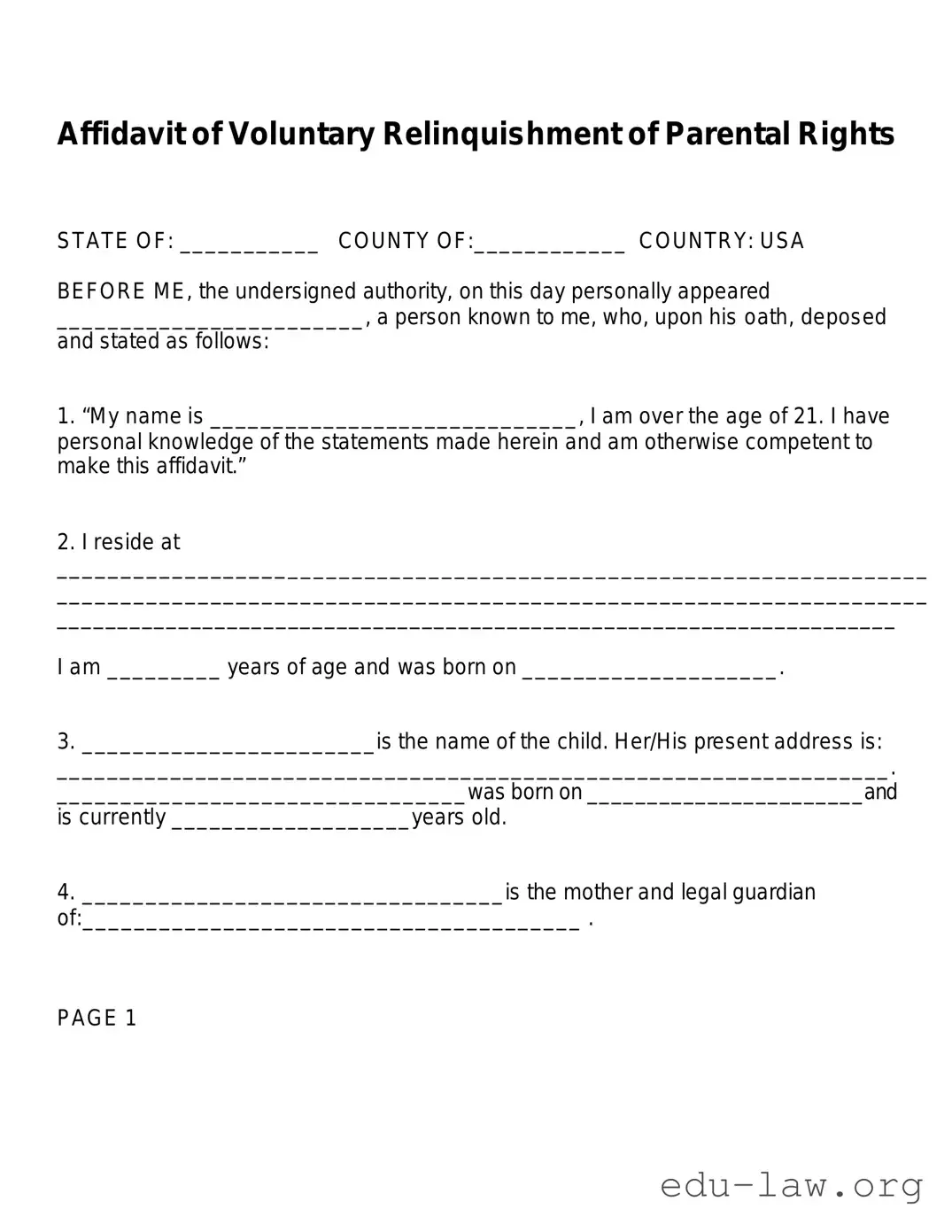Affidavit of Voluntary Relinquishment of Parental Rights
STATE OF: ___________ COUNTY OF:____________ COUNTRY: USA
BEFORE ME, the undersigned authority, on this day personally appeared
________________________, a person known to me, who, upon his oath, deposed
and stated as follows:
1.“My name is _____________________________, I am over the age of 21. I have personal knowledge of the statements made herein and am otherwise competent to make this affidavit.”
2.I reside at
____________________________________________________________________
____________________________________________________________________
_____________________________________________________________________
I am _________ years of age and was born on ____________________.
3._______________________is the name of the child. Her/His present address is:
__________________________________________________________________.
________________________________was born on _______________________and is currently ___________________years old.
4._________________________________is the mother and legal guardian
of:_______________________________________ .
PAGE 1
5.Choose one (5A or 5B) by placing an X in the box in front of the statement and completing the statement.
5A. |
[ |
] I am not presently under an obligation by court order to make payments for the |
support of ______________________________________. |
or |
|
|
5B. |
[ |
] I am presently under an obligation by court order to make payments for the |
support of ______________________________________.
6.___________________________________ presently does not own any property of value, real or otherwise.
7.It is my belief that termination of my parent-child relationship with
__________________________________ is in her/his (circle one) best interest for the following reason (s):
____________________________________________________________________
____________________________________________________________________
____________________________________________________________________
____________________________________________________________________
____________________________________________________________________
____________________________________________________________________
____________________________________________________________________
____________________________________________________________________
____________________________________________________________________
____________________________________________________________________
____________________________________________________________________
_____________________________________________________________________
(If more space is needed, attach an additional sheet and number it 7.)
PAGE 2
8.____________________________________________ is biological mother and current legal guardian of___________________________________
and resides at
______________________________________________________________(full address: street, city, state, zip).
9.I have been informed of parental rights and duties and herein acknowledge both the nature and extent of these rights and duties and my relinquishment of said rights and duties.
10.I am aware that my relinquishment of parental rights with respect to
_____________________________________is irrevocable (beyond the period of 11 days set forth in paragraph #11).
11.I acknowledge my right, which is evidenced by my execution of this Affidavit, to revoke this relinquishment if done so before the 11th day after the date of this Affidavit.
12.Should I choose to revoke this relinquishment, I understand that my revocation is to be communicated to ____________________________________(mother) at
___________________________________________, with telephone number (____) _________________________________ .
I understand that, to revoke this relinquishment, I must sign a statement witnessed by two (2) credible persons and verified before a person authorized to take oaths. I understand that this statement must
be delivered to _________________________________(mother) at the above
address and that a copy shall also be filed with the Clerk of the Court in which the suit for termination of the parent-child relationship has been filed, if applicable.
PAGE 3
13.My signature below additionally evidences that a copy of this Affidavit has been provided to me at the time of my signature and execution.
FURTHER AFFIANT SAYETH NOT.
Affiant
SWORN TO and subscribed before me on this day of _______________ 20____.
Notary Public in and for the State of __________________________. My Commission
Expires:__________________________________
Signature of Notary_______________________________________
________________________________SIGNATURE OF WITNESS
________________________________ Witness Name Printed
PAGE 4
